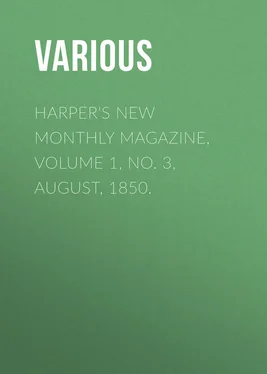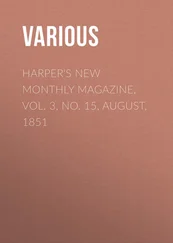Various - Harper's New Monthly Magazine, Volume 1, No. 3, August, 1850.
Здесь есть возможность читать онлайн «Various - Harper's New Monthly Magazine, Volume 1, No. 3, August, 1850.» — ознакомительный отрывок электронной книги совершенно бесплатно, а после прочтения отрывка купить полную версию. В некоторых случаях можно слушать аудио, скачать через торрент в формате fb2 и присутствует краткое содержание. Издательство: Иностранный паблик, Жанр: periodic, foreign_edu, на английском языке. Описание произведения, (предисловие) а так же отзывы посетителей доступны на портале библиотеки ЛибКат.
- Название:Harper's New Monthly Magazine, Volume 1, No. 3, August, 1850.
- Автор:
- Издательство:Иностранный паблик
- Жанр:
- Год:неизвестен
- ISBN:нет данных
- Рейтинг книги:5 / 5. Голосов: 1
-
Избранное:Добавить в избранное
- Отзывы:
-
Ваша оценка:
- 100
- 1
- 2
- 3
- 4
- 5
Harper's New Monthly Magazine, Volume 1, No. 3, August, 1850.: краткое содержание, описание и аннотация
Предлагаем к чтению аннотацию, описание, краткое содержание или предисловие (зависит от того, что написал сам автор книги «Harper's New Monthly Magazine, Volume 1, No. 3, August, 1850.»). Если вы не нашли необходимую информацию о книге — напишите в комментариях, мы постараемся отыскать её.
Harper's New Monthly Magazine, Volume 1, No. 3, August, 1850. — читать онлайн ознакомительный отрывок
Ниже представлен текст книги, разбитый по страницам. Система сохранения места последней прочитанной страницы, позволяет с удобством читать онлайн бесплатно книгу «Harper's New Monthly Magazine, Volume 1, No. 3, August, 1850.», без необходимости каждый раз заново искать на чём Вы остановились. Поставьте закладку, и сможете в любой момент перейти на страницу, на которой закончили чтение.
Интервал:
Закладка:
We reached at last a gate, which promised little; but ere long we found ourselves in one of those "high-walled gardens, green and old," which are among the glories of the East. Passing between rows of orange and lemon-trees, we reached the house, where we were received by a goodly retinue of slaves, and conducted, accompanied by our dragoman, through a long suite of apartments. In the last of them stood a tall, handsome, and rather youthful man, in splendid attire, who welcomed us with a grave courtesy. We took our seats, and were presented in due form with long pipes, and with coffee, to me far more acceptable. After a sufficient interval of time had passed for the most meditative and abstracted of men to remember his purpose, our host, reminded of what he had apparently forgotten by my companion's conjuring robes, an electrical machine, and other instruments of incantation, which the slaves carried from our carriage, civilly inquired when we intended to commence operations. "What operations?" demanded my companion, with much apparent unconcern. "The discovery of the ring." "Whenever his highness pleased, and it suited the female part of his household to make their appearance," was the answer.
At this startling proposition even the Oriental sedateness of our majestic host gave way, and he allowed his astonishment and displeasure to become visible. "Who ever heard," he demanded, "of the wives of a true believer being shown to a stranger, and that stranger an Infidel and a Frank?" As much astonished in our turn, we demanded, "When a magician had ever been heard of, who could discover a stolen treasure without being confronted either with the person who had lost or the person who had appropriated it?" For at least two hours, though relieved by intervals of silence, the battle was carried on with much occasional vehemence on his part, and on ours with an assumption of perfect indifference. Our host at last, perceiving that our obstinacy was equal to the decrees of Fate, retired, as we were informed, to consult his mother on the subject. In a few minutes he returned, and assured us that our proposition was ridiculous; upon which we rose with much dignified displeasure, and moved toward the door, stating that our beards had been made little of. A grave-looking man who belonged to the household of our host, and occupied apparently a sort of semi-ecclesiastical position, now interposed, and after some consultation it was agreed that as we were not mere men, but prophets, and infidel saints, an exception might be made in our favor without violation of the Mussulman law; not, indeed, to the extent of allowing us to profane the inner sanctuary of the harem with our presence, but so far as to admit us into in apartment adjoining it, where the women would be summoned to attend us.
Accordingly, we passed through a long suite of rooms, and at last found ourselves in a chamber lofty and large, fanned by a breeze from the Bosphorus, over which its lattices were suspended, skirted by a low divan, covered with carpets and cushions, and "invested with purpureal gleams" by the splendid hangings through which the light feebly strove. Among a confused heap of crimson pillows and orange drapery, at the remote end of the apartment, sat, or rather reclined, the mother of our reluctant host. I could observe only that she was aged, and lay there as still as if she had belonged to the vegetable, not the human world. Usually she was half-vailed by the smoke of her long pipe; but when its wreaths chanced to float aside or grow thin, her dark eyes were fixed upon us with an expression half indifferent and half averse.
Presently a murmur of light feet was heard in an adjoining chamber: on it moved along the floor of the gallery; and in trooped the company of wives and female slaves. They laughed softly and musically as they entered, but seemed frightened also; and at once raising their shawls and drawing down their vails, they glided simultaneously into a semicircle, and stood there with hands folded on their breasts. I sat opposite to them, drinking coffee and smoking, or pretending to smoke a pipe eight feet long: at one side stood the Mollah and some male members of the household: at the other stood the handsome husband, apparently but little contented with the course matters had taken; and my friend, the magician, moved about among the implements of his art clad in a black gown spangled with flame-colored devices, strange enough to strike a bold heart with awe. Beyond the semicircle stood two children, a boy and a girl, holding in their hands twisted rods of barley-sugar about a yard long each, which they sucked assiduously the whole time of our visit. There they stood, mute and still as statues, with dark eyes fixed, now on us, and now on the extremity of their sugar wands.
My companion commenced operations by displaying a number of conjuring tricks intended to impress all present with the loftiest opinion of his powers, and stopped every now and then to make his dragoman explain that it would prove in vain to endeavor to deceive a being endowed with such gifts. To these expositions the women apparently paid but little attention; but the conjuring feats delighted them; and again and again they laughed until, literally, the head of each dropped on her neighbor's shoulder. After a time the husband, who alone had never appeared the least entertained, interposed, and asked the conjuror whether he had yet discovered the guilty party. With the utmost coolness, my friend replied, "Certainly not: how could he while His Highness's wives continued vailed?" This new demand created new confusion and a long debate: I thought, however, that the women seemed rather to advocate our cause. The husband, the Mollah, and the mother again consulted; and in another moment the vails had dropped, and the beauty of many an Eastern nation stood before us revealed.
Four of those unvailed Orientals were, as we were informed, wives, and six were slaves. The former were beautiful indeed, though beautiful in different degrees and in various styles of beauty: of the latter two only. They were, all of them, tall, slender, and dark-eyed, "shadowing high beauty in their airy brows," and uniting a mystical with a luxurious expression, like that of Sibyls who had been feasting with Cleopatra. There was something to me strange as well as lovely in their aspect – as strange as their condition, which seems a state half-way between marriage and widowhood. They see no man except their husband; and a visit from him (except in the case of the favorite) is a rare and marvelous occurrence, like an eclipse of the sun. Their bearing toward each other was that of sisters: in their movements I remarked an extraordinary sympathy, which was the more striking on account of their rapid transitions from the extreme of alarm to child-like wonder, and again to boundless mirth.
The favorite wife was a Circassian, and a fairer vision it would not be easy to see. Intellectual in expression she could hardly be called; yet she was full of dignity, as well as of pliant grace and of sweetness. Her large black eyes, beaming with a soft and stealthy radiance, seemed as if they would have yielded light in the darkness; and the heavy waves of her hair, which, in the excitement of the tumultuous scene, she carelessly flung over her shoulders, gleamed like a mirror. Her complexion was the most exquisite I have ever seen, its smooth and pearly purity being tinged with a color, unlike that of flower or of fruit, of bud or of berry, but which reminded me of the vivid and delicate tints which sometimes streak the inside of a shell. Though tall she seemed as light as if she had been an embodied cloud, hovering over the rich carpets like a child that does not feel the weight of its body; and though stately in the intervals of rest, her mirth was a sort of rapture. She, too, had that peculiar luxuriousness of aspect, in no degree opposed to modesty, which belongs to the East: around her lips was wreathed, in their stillness, an expression at once pleasurable and pathetic, which seemed ever ready to break forth into a smile: her hands seemed to leave with regret whatever they had rested on, and in parting to leave something behind; and in all her soft and witching beauty she reminded me of Browning's lines —
Читать дальшеИнтервал:
Закладка:
Похожие книги на «Harper's New Monthly Magazine, Volume 1, No. 3, August, 1850.»
Представляем Вашему вниманию похожие книги на «Harper's New Monthly Magazine, Volume 1, No. 3, August, 1850.» списком для выбора. Мы отобрали схожую по названию и смыслу литературу в надежде предоставить читателям больше вариантов отыскать новые, интересные, ещё непрочитанные произведения.
Обсуждение, отзывы о книге «Harper's New Monthly Magazine, Volume 1, No. 3, August, 1850.» и просто собственные мнения читателей. Оставьте ваши комментарии, напишите, что Вы думаете о произведении, его смысле или главных героях. Укажите что конкретно понравилось, а что нет, и почему Вы так считаете.












